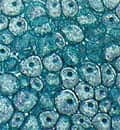
Because premature babies have underdeveloped lungs, they sometimes struggle to get enough oxygen. This can result in hypoxia and the need for ventilator assistance to breathe. Their lungs are also susceptible to inflammation, which can lead to poor lung growth and chronic lung disease. Also associated with inflammation is pulmonary hypertension (PH), dangerously high blood pressure in the pulmonary artery, which can have short and long-term consequences.
“PH is a complex disease fueled by diverse, intertwined cellular and molecular pathways,” said Stella Kourembanas, MD, one of the researchers who led the study. “We have treatments that improve symptoms but no cure, largely because of this complexity. We need to be able to target more than one pathway at a time.”
The study found that injecting just purified exosomes from MSCs reduced lung inflammation and prevented the occurrence of PH in their animal model of PH. Researchers concluded that something unique to the MSC-produced exosomes is required for their protective effect. Kourembanas hopes that future studies will lead to the development of a direct therapy for at risk premature infants.
Source: Boston Children’s Hospital








